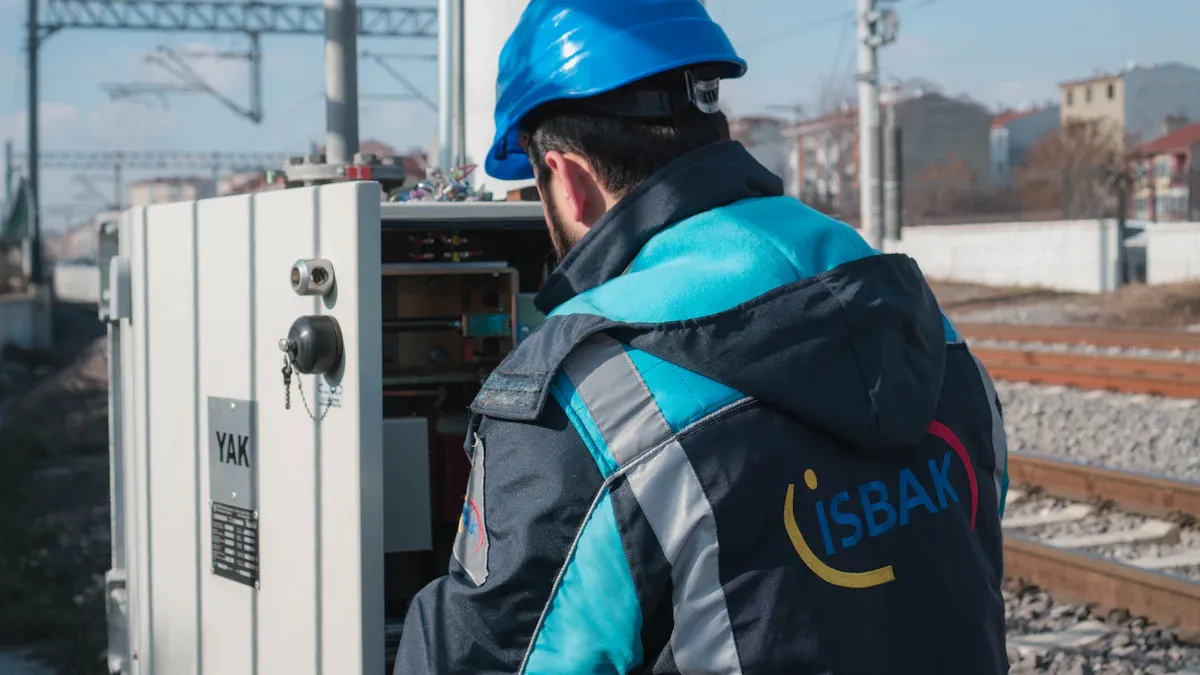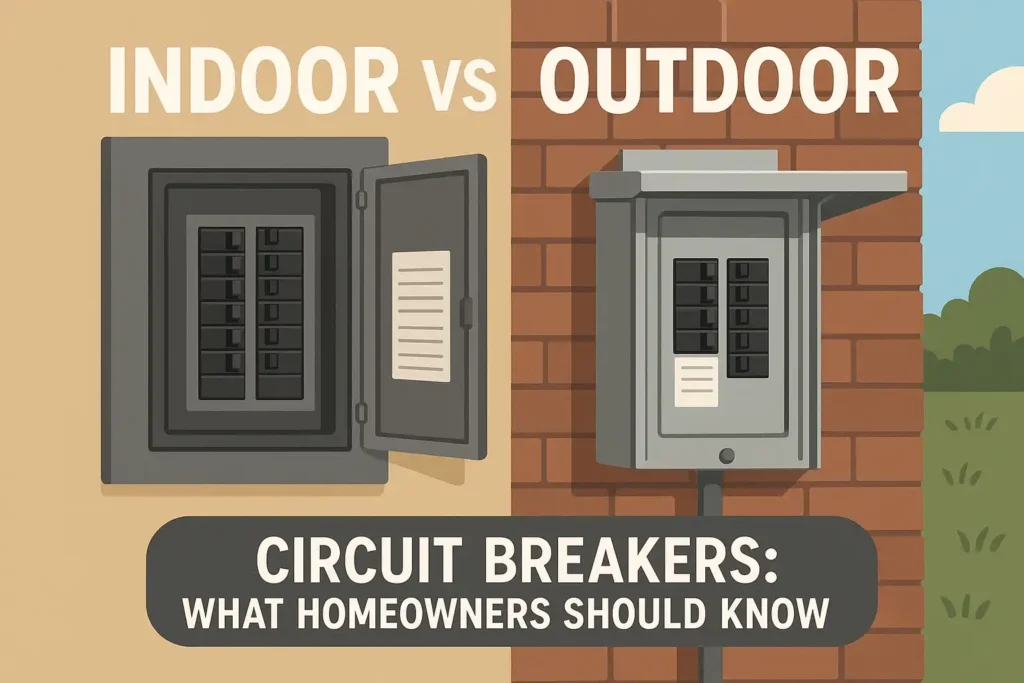You might wonder why you should think about both indoor and outdoor circuit breaker locations. Different setups can affect your safety, convenience, and even your home’s value. Circuit breaker installation plays a key role in making sure your electrical system works well. Local rules, weather, and how your home is built all matter when you choose the best spot.
Key Takeaways
- Pick indoor or outdoor circuit breaker spots for safety and ease. Local rules are important too. Indoor panels are safe from rain and sun. They last longer inside. Keep them away from things that can catch fire. Outdoor panels help stop fires inside the house. They need tough covers and locks. Check them often to make sure they work. Always follow local building codes and the National Electrical Code. This keeps your home safe and legal. Ask a licensed electrician for help. They can find the safest and easiest spot that follows all rules.
Circuit Breaker Installation
When you get a circuit breaker installed, you must pick a good spot for the panel. Where you put it can change how safe your home is. It also makes a difference in how easy it is to use. The right spot helps your system work better. You have to follow local rules and think about fire or weather dangers.
Indoor Placement
A lot of people pick indoor circuit breaker installation. This keeps the panel away from rain, snow, and sun. You can check or reset breakers without going outside. This is helpful during storms or at night. Indoor panels stay cleaner and last longer because they are not in bad weather.
Tip: Put your indoor panel somewhere dry and easy to get to. Do not put it near things like wood or fabric that can burn.
Indoor panels are safer from strangers. You can control who gets to the breakers. This stops people from messing with them. But if you put the panel near things that burn, it can be dangerous. Always keep the space around the panel clear.
Outdoor Placement
Some places make you use outdoor circuit breaker installation. This is common in new homes or some areas. Outdoor panels must follow strict rules to keep you safe. They need covers that keep out rain and must use strong materials that do not rust or break in the sun. The panel should be easy to reach if there is an emergency.
- Some places, like Texas, have special rules for outdoor units. For example, the 2020 NEC wanted GFCI breakers on HVAC condenser units. This caused problems with air conditioning, so Texas waited to use the rule to keep people safe.
- Outdoor panels need GFCI outlets and covers that keep out rain. These covers let you plug things in safely.
- Installers use strong stuff like PVC, metal, or fiberglass. They seal the panel with gaskets to keep out water and dirt.
- Codes say you need tamper-resistant outlets and coatings that do not fade in the sun.
Outdoor circuit breaker installation can lower fire risk inside your house. If something goes wrong, a fire is less likely to start indoors. But outdoor panels can be hard to reach in bad weather or at night. You also need to make sure the panel is locked so no one can mess with it.
Note: Always look at your local rules before picking a spot. Some places have strict rules for outdoor panels and covers.
Picking indoor or outdoor circuit breaker installation depends on your local rules, your home’s setup, and what keeps you safe. You want a panel that is easy to reach, safe from weather, and follows all the rules.
Indoor vs Outdoor

Safety
You want your home to be safe. The location of your circuit breaker installation can affect fire risk and other dangers. Indoor panels stay protected from weather, but they can be close to things that burn. Outdoor panels lower the risk of fire inside your house, but they face more weather hazards. Here are some facts about fire hazards:
- Electrical Fire Hazards (EFHs) happen in 1 in 169 homes.
- Utility Fire Hazards (UFHs), which include outdoor hazards, occur in 1 in 112 homes.
- The combined rate for both is 1 in 67 homes.
- Outdoor hazards, like exterior wiring and equipment, make up the largest part of EFHs.
- About half of EFHs come from devices or appliances, while the rest come from home wiring and panels.
Tip: Keep the area around your panel clear and dry to lower fire risk.
Accessibility
You need to reach your circuit breaker installation quickly during an emergency. Indoor panels let you reset breakers without going outside. This helps during storms or at night. Outdoor panels can be harder to reach in bad weather. Some homes must use outdoor panels because of local rules, so you should check what your area requires.
Durability
Weather can damage outdoor panels over time. Rain, snow, and sun can wear down the materials. Installers use strong covers and weatherproof materials, but you may still need repairs sooner. Indoor panels last longer because they stay dry and clean. You should check both types often to make sure they work well.
| Location | Weather Exposure | Maintenance Needs | Typical Lifespan |
|---|---|---|---|
| Indoor | Low | Low | Longer |
| Outdoor | High | Higher | Shorter |
Security
You want to keep your electrical system safe from tampering. Indoor panels stay locked inside your home, so only people you trust can reach them. Outdoor panels need strong locks to stop strangers from opening them. If you pick an outdoor panel, you should check the lock often.
Code Compliance
Local Regulations
You have to follow local rules when picking where to put your circuit breaker. These rules are different in each city or state. Building codes say if your breaker box goes inside or outside. Warm places often use outdoor panels, but not always. Outdoor panels can help workers get to your panel faster. Old homes may not have much space inside, so outdoor panels are needed. Safety is a big reason for these rules. Outdoor panels can help stop fires inside your house.
- Building codes decide if you use indoor or outdoor panels.
- Warm places often use outdoor panels, but not everywhere.
- Outdoor panels make it easier for you and workers to reach.
- Safety rules help lower fire danger inside your home.
- Old houses may need outdoor panels because of small spaces.
- Always ask an electrician or local office for advice.
| Aspect | Indoor Installation | Outdoor Installation |
|---|---|---|
| Access Control | Locked rooms or enclosures | Fenced or locked enclosures, often 7 ft high |
| Physical Protection | Metal boxes, marked with caution signs | Guards against damage, locked if accessible |
| Elevation/Placement | Raised platforms, clear space around panel | Locked if less than 8 ft above ground |
| Marking and Signage | Warning signs for unqualified persons | Similar signs, tamper-resistant hardware |
| Locking Requirements | Locks for unqualified access | Locked or bolted covers |
Local rules can be hard to follow sometimes. In Florida, people argued about cost and safety in 2016. Builders did not want to pay for more AFCI breakers. Safety experts wanted more protection. This shows you must think about safety, cost, and the rules.
NEC Requirements
The National Electrical Code (NEC) is the main rule for electrical safety in the U.S. You must follow these rules to keep your home safe and legal. The NEC started using Arc Fault Circuit Interrupters (AFCIs) in 1999. These devices help stop electrical fires. Over time, the NEC said to use AFCIs in more rooms, like kitchens and laundry rooms.
| Aspect | Statistical Evidence | Impact on Placement Decisions |
|---|---|---|
| NEC AFCI Mandate Start Year | 1999 | Requires AFCIs in certain circuits |
| Fire Prevention Effectiveness | AFCIs prevent nearly 50% of home electrical fires | NEC rules lower fire risk in key home areas |
| Reduction in Electrical Fires | Fires dropped from 75,000 (1980) to 25,000 (2017-19) | NEC-driven AFCI use cuts fire numbers |
| Decrease in Deaths/Injuries | Deaths down 15%, injuries down 20% | NEC rules save lives and reduce harm |
| Expansion of AFCI Coverage | 2014: Added kitchens and laundry rooms | More rooms now need AFCI breakers |
| Cost and Technology | Lower costs, fewer false alarms | Easier to follow NEC without high expense |
You should care about NEC rules because they keep your family and home safe. Following these rules helps you avoid fines and problems with insurance. NEC rules also say where you might need to put breakers, especially in rooms with more fire danger. By following both local and NEC rules, you make your home safer and more dependable.
Making the Choice
Home Layout
When you pick where to put your circuit breaker installation, look at your home’s layout. The size and shape of your house matter a lot. If your house is big or has little space inside, you may need an outdoor panel. Some homes, especially old ones, do not have enough room for a safe indoor panel.
Think about how easy it is to reach the panel. If you put it in a hard-to-reach spot, you might have trouble in an emergency. A panel near the main door or in a dry, open place inside helps you act fast if something goes wrong.
Tip: Always check your local building codes. Some places want outdoor panels so firefighters can turn off power quickly.
Studies show most people pick indoor panels for better weather protection and more security. Outdoor panels are picked when codes require them or there is not enough space inside. You should think about these things to keep your home safe and easy to use.
Professional Advice
You should always talk to a licensed electrician before you decide. Electricians know the newest codes and can see problems you might miss. They help you find the safest and best spot for your circuit breaker installation.
- Professional advice helps you follow all safety rules.
- Experts use facts and experience to pick the best spot.
- Electricians can check for risks you may not notice.
- Studies show expert help leads to better care and fewer problems later.
- Good advice can make your electrical system last longer and stay safer.
Note: A professional can help you balance safety, easy access, and code rules. This keeps your home safer for everyone.
When you get expert help, you make a smarter choice. You lower your risk of fire, damage, or costly repairs. You also make sure your home follows all the rules.
Picking indoor or outdoor circuit breaker locations is important for your safety and comfort. Indoor panels keep out rain and snow and are safer from strangers. Outdoor panels can help stop fires from starting inside your house. You must always follow local rules and safety steps because:
- If you put too much on a breaker or forget labels, fires or shocks can happen.
- The right breaker type, like GFCIs, helps keep you safe from harm.
- Getting help from a pro makes sure your panel is put in right and works well.
Talk to a licensed electrician to find the best choice for your home.
FAQ
Why should you care about where your circuit breaker is located?
You want your home to be safe and simple to use. If you put the panel in a good spot, you can get to it fast if there is trouble. The right place also keeps your electrical system safe from bad weather and people who should not touch it.
Why do some homes require outdoor circuit breaker panels?
Some places have rules that say you need outdoor panels for safety or easy use. In warmer places, outdoor panels are more common. Outdoor panels help firefighters or workers turn off power quickly if there is an emergency.
Why does code compliance matter for circuit breaker placement?
You have to follow the rules to keep your home safe and legal. These rules help stop fires and lower the chance of electrical accidents. If you do not follow the rules, your insurance might not pay for damage.
Why should you ask a professional before choosing a panel location?
A licensed electrician knows the newest safety rules. They can give you advice that fits your home. This helps you avoid mistakes and keeps your family safe.
Why do indoor panels last longer than outdoor ones?
Indoor panels stay dry and clean. They do not get rain, snow, or sun on them. This helps them last longer and need fewer repairs.
The following information may be of interest to you
Can surge protectors be installed outdoors
What is a waterproof outdoor distribution box
Steel distribution protection box
Why does my circuit breaker trip when it rains?
Can moisture cause circuit breakers to trip



